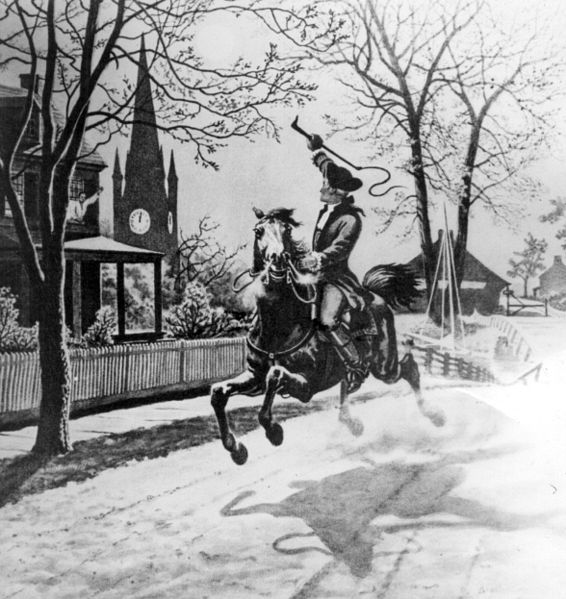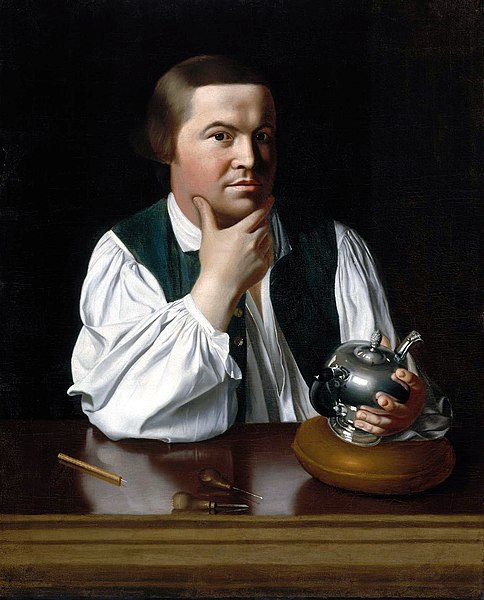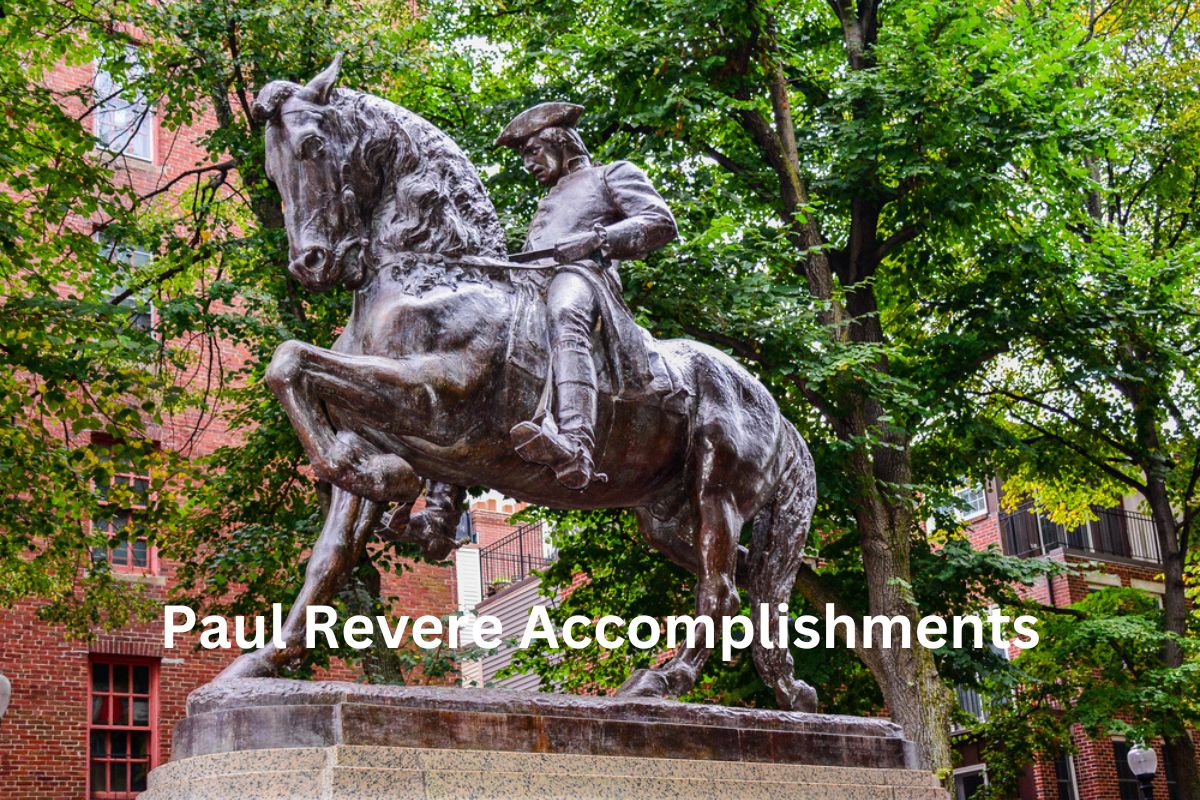Paul Revere (1735-1818) was an American patriot, silversmith, engraver, and military leader. Born in Boston, Massachusetts, Revere became a prominent figure in the American Revolution. He is best known for his daring “Midnight Ride” on April 18, 1775, during which he warned fellow patriots of the approaching British troops.
Revere was a member of the Sons of Liberty, actively involved in organizing protests against British rule. He was a skilled engraver, creating notable works such as the famous Boston Massacre engraving.
Revere also founded the Massachusetts Charitable Mechanic Association, supported the growth of the American copper industry, and served in various public positions. His contributions to the Revolution, craftsmanship, and public service made him an influential figure in shaping the early years of the United States.
Paul Revere’s legacy continues to be celebrated as a symbol of American independence and patriotism.
Accomplishments of Paul Revere
1. Midnight Ride
One of Paul Revere’s most famous and significant accomplishments was his midnight ride on April 18, 1775. Revere rode through the countryside to warn the American patriots, including Samuel Adams and John Hancock, that British troops were advancing towards Lexington and Concord.
This act of bravery and quick thinking helped to mobilize the colonial militia and played a crucial role in the early stages of the American Revolutionary War.

2. Member of the Sons of Liberty
Revere was an active member of the Sons of Liberty, a secret society formed to protest against British taxation and policies in the American colonies. He participated in their activities and meetings, working alongside other influential patriots such as Samuel Adams and John Hancock.
The Sons of Liberty played a pivotal role in organizing protests, boycotts, and acts of resistance against British rule, and Revere’s involvement helped to galvanize the movement.
3. Skilled engraver
Revere was a highly skilled silversmith and an accomplished engraver. He produced numerous engravings and illustrations throughout his career. One of his most famous engravings is the depiction of the Boston Massacre, which took place on March 5, 1770.
Also Read: Timeline of Paul Revere
Revere’s engraving, titled “The Bloody Massacre Perpetrated in King Street,” portrayed the incident as a brutal attack by British soldiers on unarmed colonists, helping to sway public opinion and fueling anti-British sentiment in the colonies.
Revere’s artistic talents and ability to capture significant events visually made him an important contributor to the dissemination of revolutionary ideas and propaganda.
4. Co-founder of the Massachusetts Charitable Mechanic Association
In 1795, Paul Revere co-founded the Massachusetts Charitable Mechanic Association (MCMA). The MCMA aimed to support and promote the interests of artisans and skilled workers in the Boston area.
It provided opportunities for craftsmen to share knowledge, showcase their work, and receive recognition for their contributions. The association played a significant role in fostering collaboration and advancing the skills and livelihoods of mechanics and craftsmen in Massachusetts.

5. Established a successful copper rolling mill
Paul Revere established a highly successful copper rolling mill in Boston. The mill produced copper sheathing, which was used to protect the hulls of ships from marine growth and improve their speed and maneuverability.
Revere’s mill played a vital role in supporting maritime industries and strengthening the American economy. His copper products were of exceptional quality and helped reduce the colonies’ reliance on imported goods from Britain.
6. Served as a lieutenant colonel in the Massachusetts militia during the Revolutionary War
During the American Revolutionary War, Paul Revere served as a lieutenant colonel in the Massachusetts militia. He actively participated in various military campaigns and played a crucial role in strengthening the defenses of Boston Harbor.
Revere’s military service demonstrated his commitment to the cause of American independence and his willingness to take up arms in defense of the colonies. His leadership and expertise were valued assets during this pivotal time in American history.
7. Active in Massachusetts government and Revolutionary committees
Paul Revere was actively involved in Massachusetts government and served in various committees during the Revolutionary period. He was a member of the Massachusetts Provincial Congress, which was instrumental in organizing resistance against British rule.
Revere also served on the Committee of Safety, which played a crucial role in coordinating military preparations and organizing local defense efforts. His involvement in these committees showcased his dedication to the cause of American independence and his commitment to shaping the future of Massachusetts.
8. Produced various artistic works, including silverware and jewelry
In addition to his skills as an engraver, Paul Revere was a talented silversmith. He produced a wide range of artistic works, including silverware and jewelry.
His craftsmanship and attention to detail earned him a reputation for creating exquisite pieces that were highly sought after. Revere’s artistic contributions not only showcased his creativity but also provided him with a means of supporting himself and his family.
9. Played a role in the growth of the American copper industry
Through his establishment of a successful copper rolling mill, Paul Revere played a significant role in the growth of the American copper industry. His mill produced high-quality copper products that were used in various industries, including shipbuilding, plumbing, and manufacturing.
By reducing dependence on British imports, Revere helped foster the growth and development of domestic industries, contributing to the economic independence of the young United States.
10. Served in various public positions in Boston
Paul Revere served in several public positions in Boston, reflecting his dedication to public service. He held positions such as firewarden, selectman, and grand master of the Freemasons in Massachusetts.
As a firewarden, Revere worked to improve fire safety measures in the city, while his role as a selectman involved decision-making and governance at the local level. Additionally, his leadership in the Freemasons demonstrated his commitment to community-building and the promotion of fraternal values. Through his public service, Revere left a lasting impact on the social and civic fabric of Boston.
